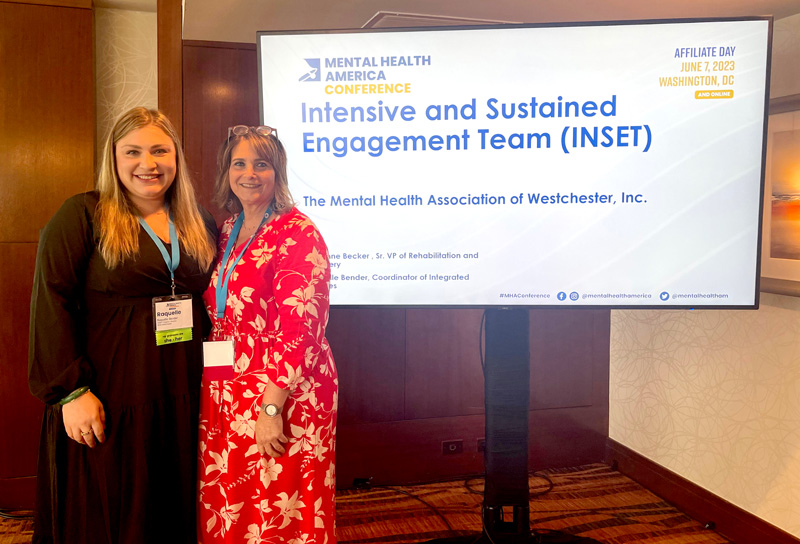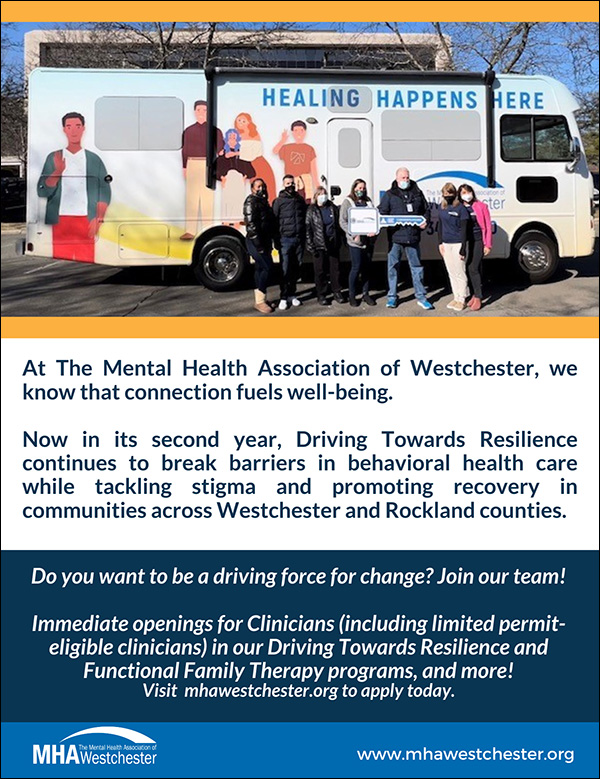Anyone involved in the mental health system, whether an individual diagnosed with a behavioral health condition, family member, or practitioner of services, knows that there is pervasive stigma in our country concerning mental health. Although the COVID pandemic has brought increased attention to the benefit of talking openly and honestly about mental health, the media often continues to portray people with a diagnosis as those of which to be wary or feared.

Raquelle and Ruthanne at the 2023 Mental Health America Affiliate Conference
The research does not support a relationship between violence and a mental health diagnosis; however, movies, television shows, and news reports frequently depict otherwise. Without the necessary balance of describing individuals as “normal” citizens of our communities who work, go to school, love, and play just like others without a diagnosis, we run the risk of promoting and continuing public, self, and structural stigma. Unfortunately, stories of individuals who are living their lives and are working on their mental health and wellness do not have the sensationalizing impact that bring viewers to movie theaters, television, or newsstands.
What the research does show is that “about two thirds (67%) of people with any mental illness in their lifetime met symptomatic recovery, meaning they no longer met the diagnostic criteria for a particular illness. The rate at which people recover from mental illness and attain moderate to good, rather than optimal, levels of well-being is likely much higher, the researchers speculate.”1
However, those in the mental health field also know that there are certain individuals who have a behavioral health diagnosis who are struggling and not getting the type of services that support their vision of their own recovery. Instead, they are vulnerable to being coerced into support services and treatment that are not wanted, effective, or necessary. These experiences can often lead individuals to be distrustful of the mental health system and those who are employed by “the system.” This mistrust of “the system” makes it more difficult to introduce support services that do invite collaboration and dialogue. These types of supports help to destigmatize mental health issues for individuals who traditionally shy away from support or have been traumatized by the mental health system because they have received inadequate, coercive, and/ or ineffective services.
In 1999, New York State Enacted Legislation that “provides for Assisted Outpatient Treatment for certain people with mental illness who, in view of their treatment history and present circumstances, are unlikely to survive safely in the community without supervision. This law is commonly referred to as “Kendra’s Law.””2 Supporters of Kendra’s law and AOT “point to statistics showing reduced rates of hospitalization, arrests, and homelessness among people who receive AOT orders, but research also suggests that compulsory treatment is no more effective than voluntary treatment – and, in some cases, may even cause harm.”3
In 2017, The Mental Health Association of Westchester, in collaboration with the New York Association of Psychiatric Rehabilitation Services (NYAPRS) and a legislative grant from New York State Assemblywoman Aileen Gunther, created an Intensive and Sustained Engagement Team (INSET) to utilize a persistent, yet non-coercive, approach to seek out individuals who were at risk of being court-ordered for Assisted Outpatient Treatment (AOT) or had an AOT order in place.
Offering a voluntary set of supports and peer services, INSET is available to individuals who meet AOT criteria or for those who have been court ordered to have AOT and are interested in the service. These individuals are often characterized as being difficult to engage or “non-compliant,” which further stigmatizes them and often leads to short-term treatment where individuals only attend treatment until they are no longer mandated to receive services. “Poor engagement may lead to exacerbation of symptoms, re-hospitalization, and not fully realizing the potential benefits of treatment.”4
INSET’s philosophy empowers individuals and encourages recovery by increasing personal agency, self-determination, and shared decision-making. Unfortunately, the population of individuals served by INSET have not usually had the opportunity to participate in services that are respectful of their choices and desires. In fact, in most cases, there is a prolonged amount of time to engage individuals into INSET, as trust is regained. However, participants who have been categorized as difficult to engage and therefore in need of mandated services voluntarily engage in INSET supports and services at a rate of 83%.
It is our contention that these individuals are not difficult to engage and when and if they are able to get the support they want and need, they will no longer be viewed as a “risk to the community.” We believe that they have not been involved in services that examine the reasons behind their inability to connect and the associated traumas they have experienced. Additionally, since most traditional services require quick engagement so that they are able to be enrolled, the lengthy engagement phase that INSET provides allows for the development and building of rapport, trust, and mutuality.
Mutuality in peer services is defined as “a non-hierarchical relationship that is of equal value to both parties and is based on a shared experience of service use and recovery. An ability to draw on the knowledge that peer support is: non-directive – helping the person find solutions that work for them, rather than suggesting solutions,”5 INSET participants have been able to find true partnership with the INSET team, which has resulted in decreased hospitalizations (length of stay and frequency), involvement in the criminal justice system, and increases in employment, training, and stable housing opportunities.
Gigi, a participant of INSET, had two hospitalizations in another state, and after a particularly bad breakup, she ended up returning to New York to live with her parents. When she came home, she did not have a therapist or connection to any mental health supports. She started to experience symptoms related to bipolar disorder, which led her parents to call 911. During this hospitalization, Gigi was placed on AOT. Although a very bright woman with a college education, Gigi admits that she struggled to understand the court process that she was participating in and did not fully appreciate how “limiting” the AOT would be. For example, she had no choice in what medications she would be prescribed and although she attempted to advocate for herself when a medication was causing side effects, she was told that she would be out of compliance if she did not take the medication. After successfully completing her AOT, she was working and living her life when her medications became ineffective. Gigi decided to seek a hospitalization to help her with a medication change and to ensure that she had coping mechanisms to deal with the stressors in her life. She was unaware that this choice would lead to her being referred for AOT again without any other options.
Gigi stated that “having an AOT made me feel worse about myself and my diagnosis. It was very stigmatizing.” She further added that she “toughed it out” but the experience made her distrustful of her mental health providers, psychiatrists, and family members. Fortunately, she was able to forge a trusting relationship with a care manager, who referred her to a therapist at MHA, who then referred her to MHA’s INSET program. Gigi states that she knew from her first meeting with an INSET peer that things were going to be different. “It was very casual. It was not a meeting where you had to do a bunch of things or fill out a bunch of paperwork. She [my peer] went at my own pace. The first meeting, we went to Dunkin, and it was nice because she got me a treat and we just sat there and chatted. It felt different from other mental health services.” She further added that the voluntary aspect of peer services helped her to combat the feeling of not having many choices.
Through her team at MHA, Gigi was connected to MHA’s Peer Specialist Training program, which she successfully completed. She is now awaiting her New York Certified Peer Specialist-Provisional (NYCPS-P) certification, and her goal is to find employment as a Peer Specialist, so she can provide supports to others who need to be engaged persistently, without coercive methods, treated with dignity and respect, and given a variety of choices to pursue their own dreams and desires.
As we continue to witness the success of INSET’s model for Gigi and many others who are able to avoid unnecessary hospitalizations or incarcerations while building fulfilling lives in the community, we are pleased to see the commitment of New York in the recent Executive Budget. With the proposed inclusion of $2.8 million to expand INSET through the creation of three new teams in NYS, more adults with a serious mental illness diagnosis will have access to peer-based outreach and engagement.
“I think INSET’s peer support is the way of the future,” shares Gigi. “It’s the way of moving forward – out of the things that don’t work in mental health – into a new place where they do.”
Ruthanne Becker, MA, is Senior Vice-President of Rehabilitation Services, and Raquelle Bender, LMHC, is Coordinator of Integrated Services, at The MHA of Westchester.
Footnotes
- Optimal Well-Being After Psychopathology: Prevalence and Correlates, A.R. Devendorf, J. Rottenberg and R. Rum, 2022.
- Assisted Outpatient Treatment
- https://theappeal.org/assisted-outpatient-treatment-criminalization-mental-illnes/
- Treatment engagement of individuals experiencing mental illness: review and update, Dixon, et al, 2016
- www.ucl.ac.uk/pals/sites/pals/files/1_understanding_the_values_of_peer_support_and_the_principles_that_underpin_them.pdf





[…] to see today’s announcement from Governor Hochul awarding the last of 4 previously authorized INSET (Intensive and Sustained Engagement Team) programs to Recovery Options Made Easy (ROME) in Western […]